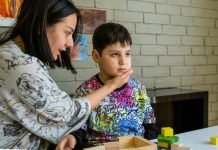
For many years, some parents have noticed that their autistic children’s behavioral symptoms diminished when they had a fever.
This phenomenon has been documented in at least two large-scale studies over the past 15 years, but it was unclear why fever would have such an effect.
In a new study, researchers found the cellular mechanisms that may underlie this phenomenon.
They found that in some cases of infection, an immune molecule called IL-17a is released and suppresses a small region of the brain’s cortex linked to social behavioral deficits.
The research was conducted by a team from MIT and Harvard Medical School.
The team has previously explored other links between inflammation and autism.
In 2016, they showed that mice born to mothers who experience a severe infection during pregnancy are much more likely to show behavioral symptoms such as deficits in sociability, repetitive behaviors, and abnormal communication.
They found that this is caused by exposure to maternal IL-17a, which produces defects in a specific brain region of the developing embryos.
This brain region, S1DZ, is part of the somatosensory cortex and is believed to be responsible for sensing where the body is in space.
A link between infection during pregnancy and autism in children has also been seen in humans. These infections included influenza, viral gastroenteritis, and severe urinary tract infections.
In the new study, the team turned their attention to the often-reported link between fever and the reduction of autism symptoms.
The researchers began by studying mice that exhibited behavioral symptoms due to exposure to inflammation during gestation.
They injected these mice with a bacterial component called LPS, which induces a fever response, and found that the animals’ social interactions were temporarily restored to normal.
This suggests that the immune system uses molecules like IL-17a to directly talk to the brain.
The study provides another example of how the brain can be modulated by the immune system.
The team says the same immune molecule, IL-17a, could have dramatically opposite effects depending on context:
Promoting autism-like behaviors when it acts on the developing fetal brain and reducing autism-like behaviors when it modulates neural activity in the adult brain.
One author of the study is Gloria Choi, the Samuel A. Goldblith Career Development Assistant Professor of Applied Biology.
The study is published in Nature.
Copyright © 2019 Knowridge Science Report. All rights reserved.



